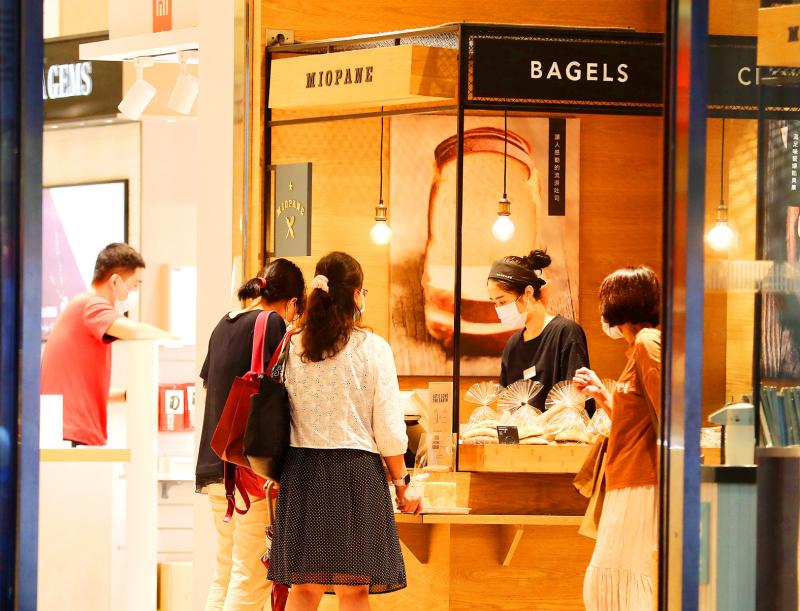The government’s business climate monitor last month showed “yellow-blue” for the fifth straight month, with the domestic economy stalled amid the COVID-19 pandemic, although it is starting to show signs of improvement, the National Development Council (NDC) said yesterday.
“Though the gauge continued to point to a slowdown, the total score gained 2 points, rising to 21 from 19, suggesting that the economy is improving,” council research director Wu Ming-huei (吳明蕙) told a media briefing in Taipei.
The council uses a five-color spectrum to portray the nation’s economic landscape, with “green” indicating steady growth, “red” suggesting overheating and “blue” signaling a recession. Dual colors indicate a transition.

Photo: CNA
Component measures of the TAIEX, and imports of machinery and electrical equipment improved, while the reading on industrial production dropped, the council said.
The remaining five subindices were steady, it said.
Imports of capital equipment rose 13.2 percent year-on-year last month to US$4.07 billion as local semiconductor firms sought to upgrade their technologies to meet demand, government data showed.
Taiwan Semiconductor Manufacturing Co (TSMC, 台積電) on July 16 increased its planned capital expenditure this year by US$1 billion, citing demand from 5G infrastructure deployment and high-performance computing applications.
TSMC, the world’s largest contract chip maker whose customers include Apple Inc, Advanced Micro Devices Inc, Qualcomm Inc and Nvidia Corp, has purchased four plots of land in Taiwan so far this year to accommodate new facilities.
The index of leading indicators, which predicts the economic situation for the following six months, increased 1.23 percent to 102.39, its third straight month of gains, on the back of improved export orders, business sentiment and labor accession rates, the council said.
However, the pickup is not even or fast enough to suggest a recovery, Wu said, adding that business at non-tech firms remained sluggish.
It would be safer to bet on a recovery when the cumulative improvement exceeds 5 percent, remains so for five straight months and encompasses most sectors, she said.
The index of coincident indicators, which reflects the current economic situation, weakened 0.1 percent to 98.79, weighed by unfavorable non-farm payrolls, overall power consumption and industrial output, the council said.
Until the global pandemic stabilizes, uncertainty would continue to disrupt life and haunt manufacturing and business activity, Wu said.

MULTIFACETED: A task force has analyzed possible scenarios and created responses to assist domestic industries in dealing with US tariffs, the economics minister said The Executive Yuan is tomorrow to announce countermeasures to US President Donald Trump’s planned reciprocal tariffs, although the details of the plan would not be made public until Monday next week, Minister of Economic Affairs J.W. Kuo (郭智輝) said yesterday. The Cabinet established an economic and trade task force in November last year to deal with US trade and tariff related issues, Kuo told reporters outside the legislature in Taipei. The task force has been analyzing and evaluating all kinds of scenarios to identify suitable responses and determine how best to assist domestic industries in managing the effects of Trump’s tariffs, he

TIGHT-LIPPED: UMC said it had no merger plans at the moment, after Nikkei Asia reported that the firm and GlobalFoundries were considering restarting merger talks United Microelectronics Corp (UMC, 聯電), the world’s No. 4 contract chipmaker, yesterday launched a new US$5 billion 12-inch chip factory in Singapore as part of its latest effort to diversify its manufacturing footprint amid growing geopolitical risks. The new factory, adjacent to UMC’s existing Singapore fab in the Pasir Res Wafer Fab Park, is scheduled to enter volume production next year, utilizing mature 22-nanometer and 28-nanometer process technologies, UMC said in a statement. The company plans to invest US$5 billion during the first phase of the new fab, which would have an installed capacity of 30,000 12-inch wafers per month, it said. The

Taiwan’s official purchasing managers’ index (PMI) last month rose 0.2 percentage points to 54.2, in a second consecutive month of expansion, thanks to front-loading demand intended to avoid potential US tariff hikes, the Chung-Hua Institution for Economic Research (CIER, 中華經濟研究院) said yesterday. While short-term demand appeared robust, uncertainties rose due to US President Donald Trump’s unpredictable trade policy, CIER president Lien Hsien-ming (連賢明) told a news conference in Taipei. Taiwan’s economy this year would be characterized by high-level fluctuations and the volatility would be wilder than most expect, Lien said Demand for electronics, particularly semiconductors, continues to benefit from US technology giants’ effort

‘SWASTICAR’: Tesla CEO Elon Musk’s close association with Donald Trump has prompted opponents to brand him a ‘Nazi’ and resulted in a dramatic drop in sales Demonstrators descended on Tesla Inc dealerships across the US, and in Europe and Canada on Saturday to protest company chief Elon Musk, who has amassed extraordinary power as a top adviser to US President Donald Trump. Waving signs with messages such as “Musk is stealing our money” and “Reclaim our country,” the protests largely took place peacefully following fiery episodes of vandalism on Tesla vehicles, dealerships and other facilities in recent weeks that US officials have denounced as terrorism. Hundreds rallied on Saturday outside the Tesla dealership in Manhattan. Some blasted Musk, the world’s richest man, while others demanded the shuttering of his